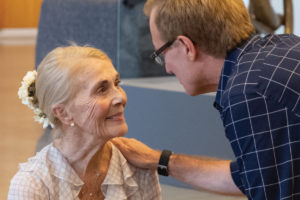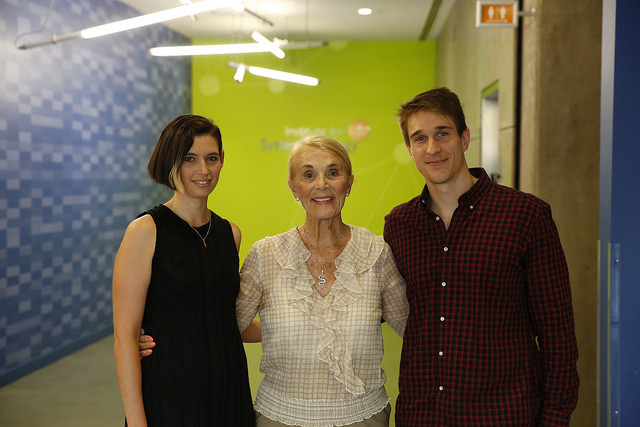‘It’s Synchronicity:’ The Decades-Long Path That Led Philanthropist Carole Ellison to ISB
 isbscience.org/news/2018/08/30/k-carole-ellison-fellows-in-bioinformatics/
isbscience.org/news/2018/08/30/k-carole-ellison-fellows-in-bioinformatics/ On a college football Saturday in the 1990s, when ISB co-founder and biotech pioneer Dr. Lee Hood was still at the University of Washington, he delivered a lecture. In the audience was Carole Ellison and her husband, Bill, who were Huskies football season ticket holders. “By happenstance, we signed up to hear him speak,” she recalled. “He was one of four people giving lectures. We chose him. I was so impressed with his enthusiasm and genius and ability to look into the future and see things the rest of us can’t in the health and science fields. I never forgot that experience. His brilliance was remarkable.”
On a college football Saturday in the 1990s, when ISB co-founder and biotech pioneer Dr. Lee Hood was still at the University of Washington, he delivered a lecture. In the audience was Carole Ellison and her husband, Bill, who were Huskies football season ticket holders. “By happenstance, we signed up to hear him speak,” she recalled. “He was one of four people giving lectures. We chose him. I was so impressed with his enthusiasm and genius and ability to look into the future and see things the rest of us can’t in the health and science fields. I never forgot that experience. His brilliance was remarkable.”
Several years later, Bill passed away from Alzheimer’s disease. Nick Newcombe operated a company that provided elder and chronic care services. “We became friends in the process,” she said of Newcombe, who is now the director of development at ISB.
“It’s synchronicity,” said Ellison, a poet, of the dual paths that came together at ISB.
Newcombe kept in contact with his friend and told her of the research happening at the Seattle non-profit and the emerging field of bioinformatics.
“What an opportunity,” said Ellison, who last week was celebrated at an ISB ceremony for creating and funding the K. Carole Ellison Fellows in Bioinformatics.
“This is monumental for fundraising at ISB,” said Newcombe. “This is the first time in our history that we have had a fellowship 100 percent funded by a philanthropist, and this is the latest way in which Carole has made a significant impact on the science of ISB.”
‘Exciting to be part of their lives’
The recently unveiled fellows program funds two young scientists researching bioinformatics.

Carole Ellison, center, poses with Anat Zimmer, left, and Tomasz Wilmanski.
The inaugural fellows are Anat Zimmer, who Ellison calls “brilliant,” and Tomasz Wilmanski, who she said “is an amazing mind.” “It’s so exciting to be part of their lives and help them along in their careers,” she said.
“I am honored and grateful to be a K. Carole Ellison Fellow in Bioinformatics,” said Zimmer. “It provides me the opportunity to be in the right place at the right time to be part of amazing science. Carole is such an inspiring, kind and warm person, and we connected on a personal level. I feel blessed for that.”
“Receiving the K. Carole Ellison Fellowship is a great opportunity, and allows me to bridge my background in nutrition and biology with various computational approaches used at ISB,” said Wilmanski. “It was also a pleasure to thank Carole in person during last week’s reception, and to meet her close friends and family.
While Ellison is responsible for ISB’s first-ever fully funded fellowship, her support of ISB has been steady for years, and was fueled by Hood’s pioneering work in P4 medicine and 21st century health care.
“The subject of wellness vs. sickness and heading off disease in advance makes much more sense than waiting for disease, putting on Band-Aids and hoping for the best,” said Ellison.
“I see it as leading edge, and it’s fun to be a part of it.”





